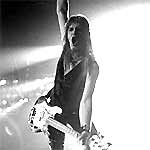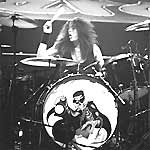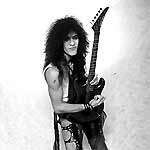| Welcome to the LOUDEST DOT COM ON THE PLANET! | |
 |

|
| Welcome to the LOUDEST DOT COM ON THE PLANET! | |
 |

|
Exclusive: Kerby's Interview With Cinderella Vocalist Tom Keifer By Jeff Kerby, Contributor Friday, October 11, 2002 @ 7:00 AM
 What appears to be lost in the translation is that this group managed to record more than a few selections during the decade of excess which have stood up favorably over time. Unlike many of the bands of that era, Cinderella actually does possess some appreciable talent -- one of the members does anyway. Anyone who has ever seen them on tour knows that Tom Kiefer is a capable musician who can carry an entire show by himself. It is an indisputable fact that if he were to ever leave the group, there would be absolutely no reason to even try to get another singer or attempt to replace him in any way, since it is obvious that he is the only significant reason for this group’s relevance. Simply put, he is the band. Whereas many lesser individuals in the metal community have managed to release truckloads of new material with varying degrees of success, Tom and company haven’t come out with anything since 1994’s Still Climbing. This doesn’t seem to be as much a case of stifled creativity as much as it appears to be a situation where the band is looking for a label to commit enough money and resources to make the new project a success. Although this wouldn’t have been an unreasonable request in 1988, Keifer and company have found that major record companies aren’t exactly shelling out fistfuls of cash to resurrect the careers of bands who haven’t gone platinum in over a decade.
By the time this interview was conducted, it was about 2:30AM, and I was completely stone cold sober despite my best efforts throughout the evening to maintain at least a modicum level of inebriation. Cinderella’s tour bus was parked in a lot right outside the hotel they’d stayed in the previous night, and they were diligently engaged in the process of gathering possessions and checking out. Standing across from Tom on the steps by the driver’s seat wasn’t exactly the most tranquil setting in the world to ask questions regarding topics ranging from my bald autograph-seeking buddy who was now $250 poorer to Kiefer’s dramatic faux collapse during “Nobody’s Fool.” Darnit, it didn’t even matter to me that I had seen him perform this exact same feat a couple of years before on the Poison tour because Tom, maybe more than anyone else currently working the ‘80s metal circuit, is a performer worthy of the price of admission.
KNAC.COM: Which is a bigger deal for you -- the anticipation that takes place before a show or the time period immediately after?
What appears to be lost in the translation is that this group managed to record more than a few selections during the decade of excess which have stood up favorably over time. Unlike many of the bands of that era, Cinderella actually does possess some appreciable talent -- one of the members does anyway. Anyone who has ever seen them on tour knows that Tom Kiefer is a capable musician who can carry an entire show by himself. It is an indisputable fact that if he were to ever leave the group, there would be absolutely no reason to even try to get another singer or attempt to replace him in any way, since it is obvious that he is the only significant reason for this group’s relevance. Simply put, he is the band. Whereas many lesser individuals in the metal community have managed to release truckloads of new material with varying degrees of success, Tom and company haven’t come out with anything since 1994’s Still Climbing. This doesn’t seem to be as much a case of stifled creativity as much as it appears to be a situation where the band is looking for a label to commit enough money and resources to make the new project a success. Although this wouldn’t have been an unreasonable request in 1988, Keifer and company have found that major record companies aren’t exactly shelling out fistfuls of cash to resurrect the careers of bands who haven’t gone platinum in over a decade.
By the time this interview was conducted, it was about 2:30AM, and I was completely stone cold sober despite my best efforts throughout the evening to maintain at least a modicum level of inebriation. Cinderella’s tour bus was parked in a lot right outside the hotel they’d stayed in the previous night, and they were diligently engaged in the process of gathering possessions and checking out. Standing across from Tom on the steps by the driver’s seat wasn’t exactly the most tranquil setting in the world to ask questions regarding topics ranging from my bald autograph-seeking buddy who was now $250 poorer to Kiefer’s dramatic faux collapse during “Nobody’s Fool.” Darnit, it didn’t even matter to me that I had seen him perform this exact same feat a couple of years before on the Poison tour because Tom, maybe more than anyone else currently working the ‘80s metal circuit, is a performer worthy of the price of admission.
KNAC.COM: Which is a bigger deal for you -- the anticipation that takes place before a show or the time period immediately after? KIEFER: It would have to be the time leading up to the show because I kind of get ready for the concert throughout the day. I have a lot of vocal warm ups that I do and just stuff that I do to prepare for the show. That’s probably where most of the anticipation is. After the concert, it’s just like, “it’s done” and you just want to go and relax. KNAC.COM: How do you manage to get motivated every single night when the material you’re playing consists of songs you’ve been performing for years? For example, what is it that you told the crowd when you collapsed tonight during “Nobody’s Fool,” and the mic wasn’t near you? KIEFER: Well, that happened during the part of the song where I said, “I’m screaming my heart out,” so when we stop, I stop right on the word “scream.” I just kind of kind of beat on my heart and scream my fucking heart out. Then we come in and we finish the song. It seems to really wind the crowd up. KNAC.COM: It is a consensus among knowledgeable metalheads that when you guys toured with Poison that you were consistently the best band on the bill night after night. What would you attribute your live success to?  KIEFER: We’ve always made an effort that any time we set foot on stage to always do the best show we can. We always give 200%. Also, before we get on stage, we make sure the production is as good as it can be -- the sound, the lights. You know, because at the end of the day, people who have paid to come and see us play should walk out feeling as though they saw something special. That’s always been the way we’ve approached shows whether we’ve been playing arenas, sheds or small clubs. We played a small place tonight, and we brought in production people that we knew could make that place sound as good as it could sound. After all that’s taken care of, then you go and get yourself psyched out to go up there and deliver everything you’ve got.
KNAC.COM: Would it surprise you if I said that I met a fan backstage who told me that he paid $250 for the chance to meet the band?
KIEFER: We’ve always made an effort that any time we set foot on stage to always do the best show we can. We always give 200%. Also, before we get on stage, we make sure the production is as good as it can be -- the sound, the lights. You know, because at the end of the day, people who have paid to come and see us play should walk out feeling as though they saw something special. That’s always been the way we’ve approached shows whether we’ve been playing arenas, sheds or small clubs. We played a small place tonight, and we brought in production people that we knew could make that place sound as good as it could sound. After all that’s taken care of, then you go and get yourself psyched out to go up there and deliver everything you’ve got.
KNAC.COM: Would it surprise you if I said that I met a fan backstage who told me that he paid $250 for the chance to meet the band? KIEFER: I guess it’s not surprising to me because I’ve heard about that type of thing happening before. It’s something that when I hear things like that, I don’t know what the word is… I just appreciate the fans because of the loyalty they have. I guess hearing that type of thing makes me appreciate them even more. Just their loyalty to the band and how into the band they are is special. I always try to sign everything I can. Obviously, you can’t always… KNAC.COM: Yeah, I think I saw that. KIEFER: You know, I was about to start signing autographs tonight, and the manager of the club chased everyone away because the cops were coming. They had a curfew or something. Anyway, I guess it just shows how dedicated our fans are and how dedicated rock fans in general are. That makes us appreciate them more too when you see that kind of thing. KNAC.COM: Cinderella’s sound is different from a lot of the other bands of the ‘80s because of the blues undercurrent that is present in many of the songs. Where does that come from? KIEFER: I got exposed early on to blues music and American roots music like country and rhythm and blues kind of second generation through bands like Led Zeppelin, the Rolling Stones and Aerosmith. All of them had these influences in their music, and I kind of delved back into what inspired them. I went back and listened to Muddy Waters, James Brown, BB King, Albert King and Robert Johnson. That way, you can kind of take it and interpret it in your own way. I love American roots music, gospel, rhythm and blues, and gospel. I think all of that was a big influence on rock and roll. KNAC.COM: Do you think it makes the music kind of timeless when you throw those influences into it? KIEFER: I think it gives it more depth and soul because when you listen to that type of music, it doesn’t get old. It doesn’t get old for me to perform our stuff live either because it’s something you can really sink your teeth into every time you sing because it’s about real stuff. It’s about feelings and good times and bad times. KNAC.COM: You mean you can bring new emotions to songs that you may have performed a thousand times over? KIEFER: Yeah, you can, because you know that if you’re feeling something on stage, it should come through your instrument. You use your instrument as a vehicle for your feelings. However you’re feeling that night, your instrument should be the tool for letting that out.  KNAC.COM: When did you realize that this was going to be your life? When did you decide that regardless of where your career might lead you that you were going to have to do this because it is just a part of you?
KNAC.COM: When did you realize that this was going to be your life? When did you decide that regardless of where your career might lead you that you were going to have to do this because it is just a part of you? KIEFER: It’s just kinda like one day at a time. There wasn’t ever really a moment where I decided that this was it. I just love music. I started playing guitar when I was eight, and it’s more of a question of one thing leading to another. Now I’ve been doing it so long that its turned into… well, I don’t know what it’s turned into. I don’t know how to do anything else. I love what I do, and this is what I’ve spend my whole life doing. I’ll be fucking honest, man, there’s times when this business is frustrating. KNAC.COM: What’s the most frustrating thing about it? KIEFER: Well, we left Polygram Records after our fourth record didn’t meet sales expectations, partly because they didn’t put a lot of effort into promoting it. It’s frustrating because you have to start over after you leave a label. There’s also kind of a negative connotation about bands of our generation, and we’ve been starting over and trying to get a record out for years. Now what’s frustrating is trying to get in the right situation to where we can get our record out in a way that people will know that it’s there. I don’t want to see it just sitting around on the shelves. That’s what we’re looking for --we have a lot of new material to make a really great record -- we’re just looking for a home for it. We want a label that cares and is gonna put time and effort into it and make the record happen for us. We’ve had offers from other labels, but they’re not what we’re looking for. We’re not just gonna make a record and throw it out there. Before we got our first record, it was the same thing. Then we landed our first deal with Polygram, and that was a great situation for a number of years -- we put out three records, and it was real smooth. It was almost like magic, but I guess what goes up must come down. I think what separates the men from the boys is who can go back up. The next step for us is to put out a record. I think playing live in the big venues is good for people to remember us and know us. KNAC.COM: Do you think the reason that ‘80s bands disappeared is because they weren’t in it for the same reasons you were? KEIFER: I don’t know if I really want to comment on that. I think that every band is their own band, and the industry labels bands. I only look at it from our perspective, and our perspective is that we were with a major label and sold ten, eleven -- I don’t even know how many fucking records -- we’ll say eleven -- for Polygram Records and made a shit load of money. Then, one day they just said, “Bye.” That’s what happened to us. All I know is we did pretty well for a label, and then they fired us. It’s their loss.  KNAC.COM: What are the biggest differences between your life today and your life in 1986 with regard to your career and they way you live and tour?
KNAC.COM: What are the biggest differences between your life today and your life in 1986 with regard to your career and they way you live and tour? KEIFER: I think that doing these shows since the band reformed and going out and doing these shows has been more gratifying and made me more appreciative. It’s like we’ve been given a second chance to do what we love to do. It’s not that we weren’t appreciative before, but now we are even more so. Now, when we’re on stage or in an arena or in a shed and there are fourteen thousand people there and they’re going nuts and they’re singing our songs, you take notice of that the second time around. The first time was just this whirlwind, and then the whirlwind stopped. Then you’re like, “Oh, fuck.” KNAC.COM: How hard was that for you? Did you just wake up one morning and go, “What the hell just happened?” KEIFER: Yeah. Yeah, kinda. It was like being told basically that nobody wants you anymore. KNAC.COM: How have the fans changed between then and now? KEIFER: I don’t think they’ve changed at all really. It’s weird because the last big venue tour we did was back in ’91. Then we reformed in ’98 and did that tour with Poison. It was like ten years later and we walked right back onto the same giant stages and the crowds were there and they were going nuts just like nothing had ever changed. We were just standing there looking at each other going, “What the fuck?” All these years we had been told that this was never gonna happen again. It’s funny, I honestly don’t believe that those people went anywhere during those ten years. I think they just weren’t being served from a menu they wanted to order from. They were being shown a different menu. The industry, MTV and the radio have the power to do that. They just decide that they aren’t going to play certain records anymore. I’m not complaining -- that’s the business. It’s our job to break through it, and say, “Fuck you, we aren’t going anywhere.” That’s what we’re doing.
| |||||
|
|
| Recent Features |
 |